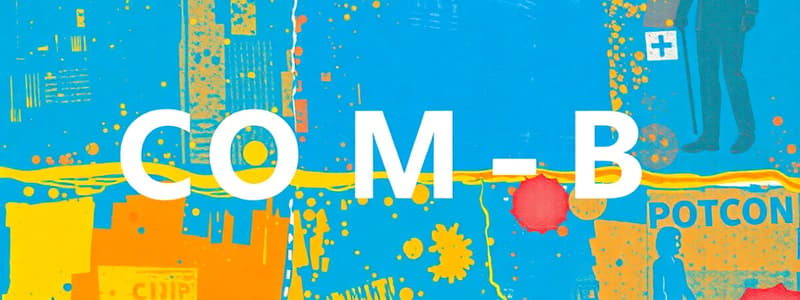Podcast
Questions and Answers
Which component of the COM-B model focuses on an individual's belief in their ability to engage in a behavior?
Which component of the COM-B model focuses on an individual's belief in their ability to engage in a behavior?
- Behavioral
- Opportunity
- Motivation
- Capability (correct)
The Transtheoretical Model suggests that change is always a linear process.
The Transtheoretical Model suggests that change is always a linear process.
False (B)
What are the three foundational perspectives of behavior change?
What are the three foundational perspectives of behavior change?
Behavioral, Cognitive, and Cognitive-Behavioural
In the Preparation stage of the Transtheoretical Model, individuals begin to take _____ steps toward following through.
In the Preparation stage of the Transtheoretical Model, individuals begin to take _____ steps toward following through.
Match the stages of the Transtheoretical Model with their corresponding definitions:
Match the stages of the Transtheoretical Model with their corresponding definitions:
What does subjective norms refer to in the Theory of Planned Behaviour?
What does subjective norms refer to in the Theory of Planned Behaviour?
Self-efficacy only relates to past experiences and does not influence future behavior.
Self-efficacy only relates to past experiences and does not influence future behavior.
What are the processes of change during the Action stage of the Transtheoretical Model?
What are the processes of change during the Action stage of the Transtheoretical Model?
Which of the following best describes self-efficacy?
Which of the following best describes self-efficacy?
Vicarious experiences involve observing others and using that information to assess one's own capabilities.
Vicarious experiences involve observing others and using that information to assess one's own capabilities.
What are the three main predictors of self-efficacy?
What are the three main predictors of self-efficacy?
The belief in one's confidence to perform a specific task is known as __________.
The belief in one's confidence to perform a specific task is known as __________.
Match each dimension of self-efficacy to its correct description:
Match each dimension of self-efficacy to its correct description:
Which statement about social cognitive theory (SCT) is true?
Which statement about social cognitive theory (SCT) is true?
Feeling physically well can increase self-efficacy.
Feeling physically well can increase self-efficacy.
Give one example of a physiological state that could affect self-efficacy.
Give one example of a physiological state that could affect self-efficacy.
Flashcards
COM-B Model
COM-B Model
A framework for understanding behavior through Capability, Opportunity, and Motivation.
Capability
Capability
Individual’s psychological and physical capacity to engage in the behavior.
Opportunity
Opportunity
Environmental factors that support or hinder behavior.
Motivation
Motivation
Signup and view all the flashcards
Behavioural Perspective
Behavioural Perspective
Signup and view all the flashcards
Cognitive Perspective
Cognitive Perspective
Signup and view all the flashcards
Transtheoretical Model (TTM)
Transtheoretical Model (TTM)
Signup and view all the flashcards
Pre-Contemplation Stage
Pre-Contemplation Stage
Signup and view all the flashcards
Contemplation Stage
Contemplation Stage
Signup and view all the flashcards
Preparation Stage
Preparation Stage
Signup and view all the flashcards
Action Stage
Action Stage
Signup and view all the flashcards
Maintenance Stage
Maintenance Stage
Signup and view all the flashcards
Theory of Planned Behaviour (TPB)
Theory of Planned Behaviour (TPB)
Signup and view all the flashcards
Self-Efficacy
Self-Efficacy
Signup and view all the flashcards
Enhancing Self-Efficacy
Enhancing Self-Efficacy
Signup and view all the flashcards
Behavioural Intentions
Behavioural Intentions
Signup and view all the flashcards
Study Notes
COM-B Model
- COM-B model is a framework for understanding behaviour
- Capability, Opportunity, and Motivation are the 3 core components of this model
- Capability: individual’s psychological and physical capacity to engage in the behaviour
- Opportunity: the physical and social environments that support or hinder behaviour
- Motivation: an individual’s reasons to engage in the behaviour
- Behaviour change theories provide additional insight into behaviour change mechanisms
Behavioural Perspective
- Views behaviour as primarily driven by reinforcement (positive or negative) and punishment
- Actions that are rewarded are more likely to be repeated, actions that are punished are less likely to be repeated
Cognitive Perspective
- Emphasizes the role of thoughts and cognitive habits in shaping behavior
- Stimulus (event or cue) elicits internal events (thoughts, interpretations) which lead to a response (behavior)
Cognitive-Behavioural Perspective
- Suggests that behavior is the result of interactions between thoughts, feelings, and actions
- Cognitions can influence emotions and behaviours, and vice versa
Transtheoretical Model (TTM)
- Individuals move through distinct stages of change
- Change in behavior is not always linear; individuals may move back and forth between stages
- Self-efficacy, Decisional balance, and Processes of Change are crucial components of this model
Pre-Contemplation Stage
- Individuals are unaware of or not considering changing their behavior
- Processes of change: Increasing awareness of the importance of change and providing information on the risks and benefits of behavior change
- Examples: A person who smokes but has no intention to quit
Contemplation Stage
- Individuals are thinking about changing their behavior in the next 6 months
- Processes of change: Investing in the behavior and incentivizing it
- Examples: Someone thinking about starting an exercise routine
Preparation Stage
- Individuals are ready to take action and making small steps towards change
- Processes of change: Setting goals and seeking social support
- Examples: Someone buying running shoes or joining a gym
Action Stage
- Individuals have actively begun to make changes in their behaviour
- Processes of change: Providing feedback, reinforcement, and enhancing self-efficacy
- Examples: Someone exercising regularly for less than 6 months
Maintenance Stage
- Individuals have maintained their behavior for at least 6 months
- Strategies for maintenance: Assisting with coping mechanisms and providing ongoing support
- Examples: Someone who has maintained a healthy diet for more than 6 months
Theory of Planned Behaviour (TPB)
- This theory explains how attitudes, subjective norms, and perceived behavioural control influence intentions and ultimately behaviour
- Intentions are the most proximal predictor of behaviour
- Stronger at predicting short-term behavior, weaker at predicting long-term behaviour
Attitudes
- Individuals' overall evaluation of engaging in a specific behaviour
- Influenced by personal beliefs about the consequences of a behaviour
- Positive attitudes towards an activity make it more likely that an individual will participate
Subjective Norms
- Social pressures and expectations that influence behaviour
- Individuals are more likely to act in accordance with the behaviours expected from their social groups.
Perceived Behavioural Control
- Individuals' belief about their ability to control their behaviour
- Includes factors such as having access to resources or opportunities needed to perform the behaviour
Behavioural Intentions
- The individual's readiness or commitment to engage in a behaviour
Self-Efficacy
- An individual’s confidence in their ability to perform specific tasks or situations
- Magnitude: How many levels of difficulty an individual believes they can perform
- Strength: How strongly an individual believes they can perform a behaviour
- Generality: How specific or generalizable is the self-efficacy belief
Enhancing Self-Efficacy
- Performance Experiences: Past success in performing a behaviour; the most powerful influence on self-efficacy
- Vicarious Experiences: Observing others perform a behaviour successfully; important for the model to be similar to the individual
- Imaginal Experiences: Mental rehearsal or visualizing oneself successfully completing a behaviour
- Verbal/Social Persuasion: Positive encouragement and feedback from others can improve self-efficacy beliefs
- Physiological and Emotional States: Physical and emotional sensations that influence self-efficacy; positive states boost confidence, negative states decrease it
Studying That Suits You
Use AI to generate personalized quizzes and flashcards to suit your learning preferences.




